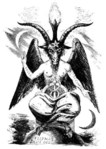Demons are very popular in modern belief and can be broken down in three categories.
Hell Demons: The "Actual" demons, as in the ones that are born from all the Hate and all evil in Hell, along with the Dark Fallen Angels.
Dimensional Demons: Beings that inhabit different dimensions or planes of existence. They could have dark intentions or be born out of spite, vile, and evil. These demons usually have an epheral existance or a not very solid composition in our plane of reality and the physical.
Earth's Demons: Beings that inhabit the Earth.
From the Greek '
daimon', or spirit, demons are powerful supernatural beings existing between god(s) and humans. Traditionally benevolent, daimon began to take on sinister themes within the writings of Plato. When the Old Testament was translated from Hebrew to Greek, the word mal'ak was used to describe foreign or evil supernatural beings. In the New Testament writings, most of which were written in Greek originally, the word daimon became associated with Satan and his minions and thusly took on a distinctly evil meaning.

As Christianity continued to spread, the word demon came to describe many of the traditional animistic spirits of Northern Europe which those carrying Christianity into the region preached against. The very name of demons has been co-opted to describe this process, the "demonizing" of foreign or contrary mythologies in the interest of spreading an invasive belief system.
The classical Greek daimon, Pan, was a nature spirit. The
goat-like features of Pan have been adopted by Christian imagery in particular as those of demons. While Pan and other daimons gave their name to the Christian demons, their habits and nature as unpleasant beings of the underworld/death more resemble an amalgam of many other creatures from Mediterranean mythology, including the netherworld guards of Greece and Egypt.
Hebrew and Christian culture considered all demons evil. In 1589, a leading expert named Brinsfield listed major demons and their specialties. These included:
Lucifer, pride; Satan, anger; Beelzebub, gluttony; and Belphegor, sloth.
Demons walk the earth. They can take animal or human form. The numerous types and forms of demons have been listed below:
PLEASE NOTE!
Different cultures define "demon" differently. In some cultures, real demons are specifically fallen angels, in others it includes any creature with monster-like features, for example a
centaur would be described by some as a demon due to the fact it has the monster like qality of being half man and half beast.
Therefore it might be best if you choose to think as demons in this four basic categories:
*Fallen Angels/Fallen Heavenly beings
*Dimensional (Exist in alternate universes/Realities)
*Demonic Monsters (Created by the devil, resoult of mans hate/desire/evil will, or black magic)
*Earthly monsters (Monsters/Mythical Creatures that might be classified as demons. Ex: Dragons, Ogres, Centaurs, Minotaurs, etc)
Please Note that these are not all as cut and dry as they may appear. For example "Evil dragons" could technically fall within all the categories, unless it is a specific type/category/specie of evil
dragon, in which case it would fit much more nicely.





 Edited by Egalitaria
Edited by Egalitaria